Dads on childbirth: ‘The midwife turned to me and said, "Listen. This really isn't good"’
Seven Dads, including the comedian Russell Brand, get real about the panic, pain and euphoria of watching their partner give birth, and explain why counting down from ten while she's pushing isn't necessarily a good idea

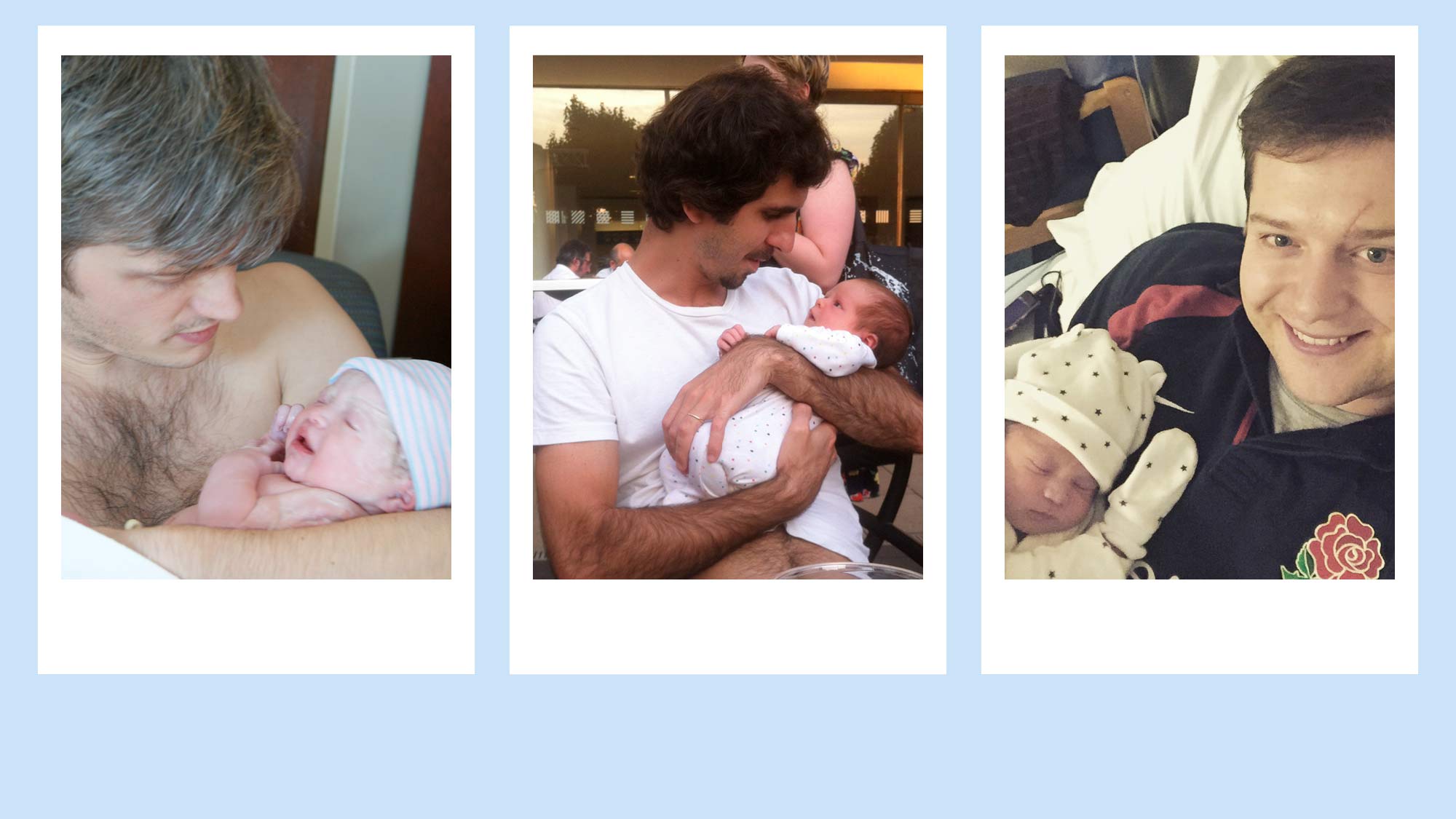
Celebrity news, beauty, fashion advice, and fascinating features, delivered straight to your inbox!
You are now subscribed
Your newsletter sign-up was successful
Seven Dads, including the comedian Russell Brand, get real about the panic, pain and euphoria of watching their partner give birth, and explain why counting down from ten while she's pushing isn't necessarily a good idea
'I was blown away by the naivety of the whole thing and wept uncontrollably'
Nick Francis's wife Antonia gave birth to their daughter Willow on 24th October 2016 in Homerton Hospital, Hackney
'The lead-up to Willow’s birth reminded me of the beach scene in Saving Private Ryan. We had done the NCT course beforehand and, like the soldiers in the landing craft, we felt we were prepared for what lay ahead of us. But nothing could have prepared me for the moment when the ramp came down and the bullets, blood and arms started flying.
We had done a hypnobirthing course, so had the yoga playlist on the iphone, essential oils and various massages ready to go. The plan was to have a fairly natural waterbirth.
We had been told the partner should make sure they get plenty of sleep in early labour as you don’t know how long it would last. When Antonia woke me at 2:30am to say that things were happening, she said she was going to get into the bath and I should rest. I lay in bed wide awake for about ten minutes, then thought “what the hell I am I doing?” and went to see how she was getting on. I had downloaded an app to time the contractions. The first timing put her at three contractions in ten minutes. That’s apparently when you should head into hospital, but when I rang them they told me not to worry and not to come in.
An hour or so later the contractions had got to five in ten minutes. I rang the hospital and, again, they were extremely laissez-faire. I felt like they weren't really listening to me. I called a cab (we had been told to use Carrot Cars in East London as they are happy to take women in labour), but when the car arrived Antonia’s contractions were so strong she wasn't sure she could get out of the bath. In the end we had a fairly protracted journey to the cab, punctuated by several pauses for noisy contractions.
The cab ride was eventful. At one stage Antonia screamed that she could feel the head between her legs.
Celebrity news, beauty, fashion advice, and fascinating features, delivered straight to your inbox!
When we arrived they took Antonia’s blood pressure in the natal ward any chance of the planned water birth went out of the window. At NCT the partners had been told that we were responsible for looking after the mums during the birthing process, acting as their guardians. It meant that I pushed quite hard to stick with our water birth plan.
The midwife told me we had to go straight into the delivery suite. I pressed her, asking if she was suggesting or telling. She turned to me and said: “Listen. This really isn’t good.” That was quite a scary thing to hear.
I don’t like hospitals. My dad died suddenly of a heart attack when I was ten. I was by the bed with the rest of my family. Seeing my older brothers cry had a massive effect on me. So did the unreality of saying goodbye to my rock of a father.
Overall I thought the hospital staff were a mix of excellent and “is this really the right job for you?” not bothered. Most were so lovely. One said it was the end of her shift and left the room moments before Willow was born.
'I could see a stream of blood pouring from her into a rapidly expanding pool on the floor'
The toughest moment was just before the delivery. Antonia’s waters hadn't broken and in the stress of the labour the baby had pooed. The baby can swallow or inhale this poo - called meconium - and suffer lifelong ill effects and potentially instant death. Because of this, the midwives were very keen that Willow was delivered very quickly. The hippy music and low lighting were brushed aside and out came the stirrups.
The delivery was forced and Antonia bled quite badly. A (holy shit something’s gone wrong) alarm went off and eight or nine doctors stressed-looking doctors came running into the room. They were ordering each other around with an urgency that sat on just the professional side of panic. Antonia had gone pale, with blue lips, and was convulsing in a fit. I could see a stream of blood pouring from her into a rapidly expanding pool on the floor.
I’ve had my fair share of hospital visits and I’ve seen lots of people hurt themselves badly. It was all put into perspective by watching a large lump of flesh being pulled from my wonderful young wife. It gave me a huge amount of respect for her, and women more generally.
They don’t tell you this but when Willow came out I had very little in the way of strong emotion towards the small screaming bundle of bloody blankets having her throat cleared. It was more of a bewildered fascination and awareness of her vulnerability. This was tinged with the numb horror that both my wife and baby seemed to be about to die.
They isolated the bleed and stitched Antonia up, but she was exhausted. She held the baby briefly, fed her and then slept. Willow slept too and I was left in the room texting a few people to tell them the key (censored) details.
'I was blown away by the naivety of the whole thing and wept uncontrollably'
My brother had his baby, Grace, three weeks earlier and came to the hospital so we could pop out for a beer. Talking to him about it made me feel a lot better.
When I returned to the hospital they moved us into another room. I went to pick up a couple of bits from the delivery room. It was empty so I thought I would have a little go on the gas and air. I really went for it, before turning to carry a pile of things out the door. At a desk nearby I saw the matron, just as the gas hit me really hard. My face went hot, my hearing went weird and I nearly lost my balance.
A couple of days later I went home to pick up some things from home. I went into the nursery we had set up for our baby. I was blown away by the naivety of the whole thing and wept uncontrollably. There we had been skipping along through the excited expectation of the pregnancy, unaware of what was around the corner.'
Nick's tips:
'Don’t ask the cabbie if this is their first fare of the day at the very moment your partner thinks they're having the baby. Apparently that is not the time for small talk.'
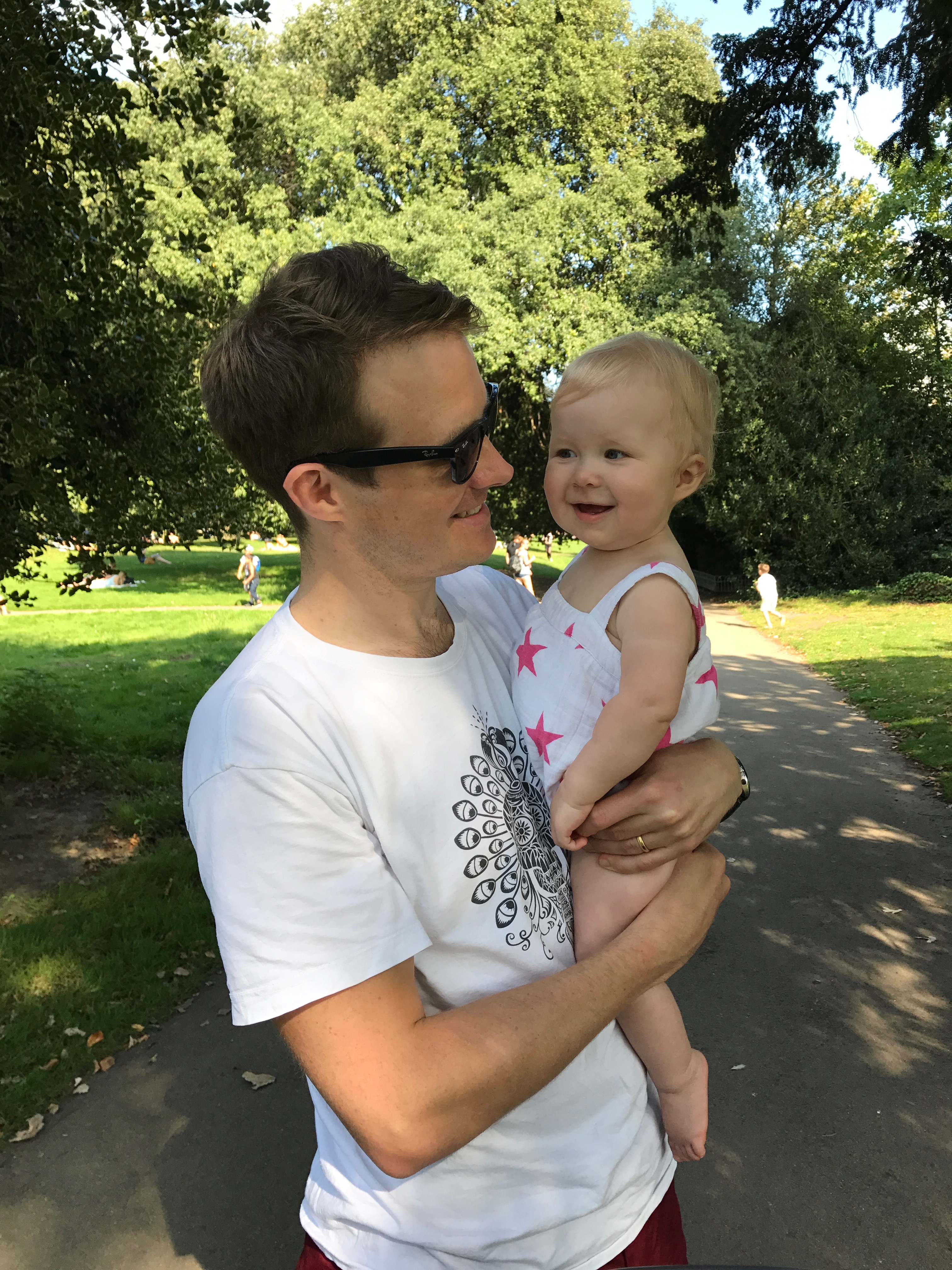
‘The experience taught me to be grateful to my Mum’
Felix Riadigos's wife Cam gave birth to their daughter Olive at home in Southwark on 22nd June
'Olive was born on the hottest day in London since the 1970s. We were told beforehand that you shouldn’t just make one birth plan, but our first choice was for Camilla to give birth at home in a birth pool we rented.
The labour lasted 28 hours. We had done a hypnobirthing course, which teaches you to look upon each contraction not as pain but more as a wave, reminding yourself that it is totally normal and will bring you nearer to meeting your baby. I was trying to be supportive and remind her to breathe it out, to think of it as something good.
I never really felt like a spare part – at the beginning I was bringing her food, water and helping with breathing. Then I needed to inflate and fill the pool, which has to be between 36 and 38 degrees, so I had to heat the water twice to get the correct temperature.
'When the baby was coming out the midwife asked for my phone and took some pictures'
Every time Cam got inside the pool she would relax and contractions would stop. We tried twice and the same thing happened, so in the end she had Olive on the living room floor.
We had a great team of home-birth midwives who helped Camilla. One came in the first hours of the contractions but we were still in early labour so she left. Another midwife came about 16 hours later, who was also amazing, and stayed with us at home for 12 hours until 4 hours after the birth. She got us to walk up and down the outside stairs (we live on the fourth floor) to help bring on more contractions. She also massaged Cam's back which was really hurting.
The most surreal moment was when the baby was coming out. The midwife asked for my phone and took some pictures to show me how she was, as I was in front holding Cam's gas & air. Suddenly she was in Cam's arms, this little person that looked so fragile.
Afterwards I remember thinking, “wow, I should really thank my Mum for going through this." Childbirth is a beautiful thing, but it’s exhausting for the Mum.'
Felix’s tip:
'Try and sleep lots before it begins. I know it’s impossible to know when the baby will arrive, but after two nights of not sleeping and suddenly taking care of your newborn… I remember saying to all my friends that are Dads, "why didn’t you tell me to sleep?"'
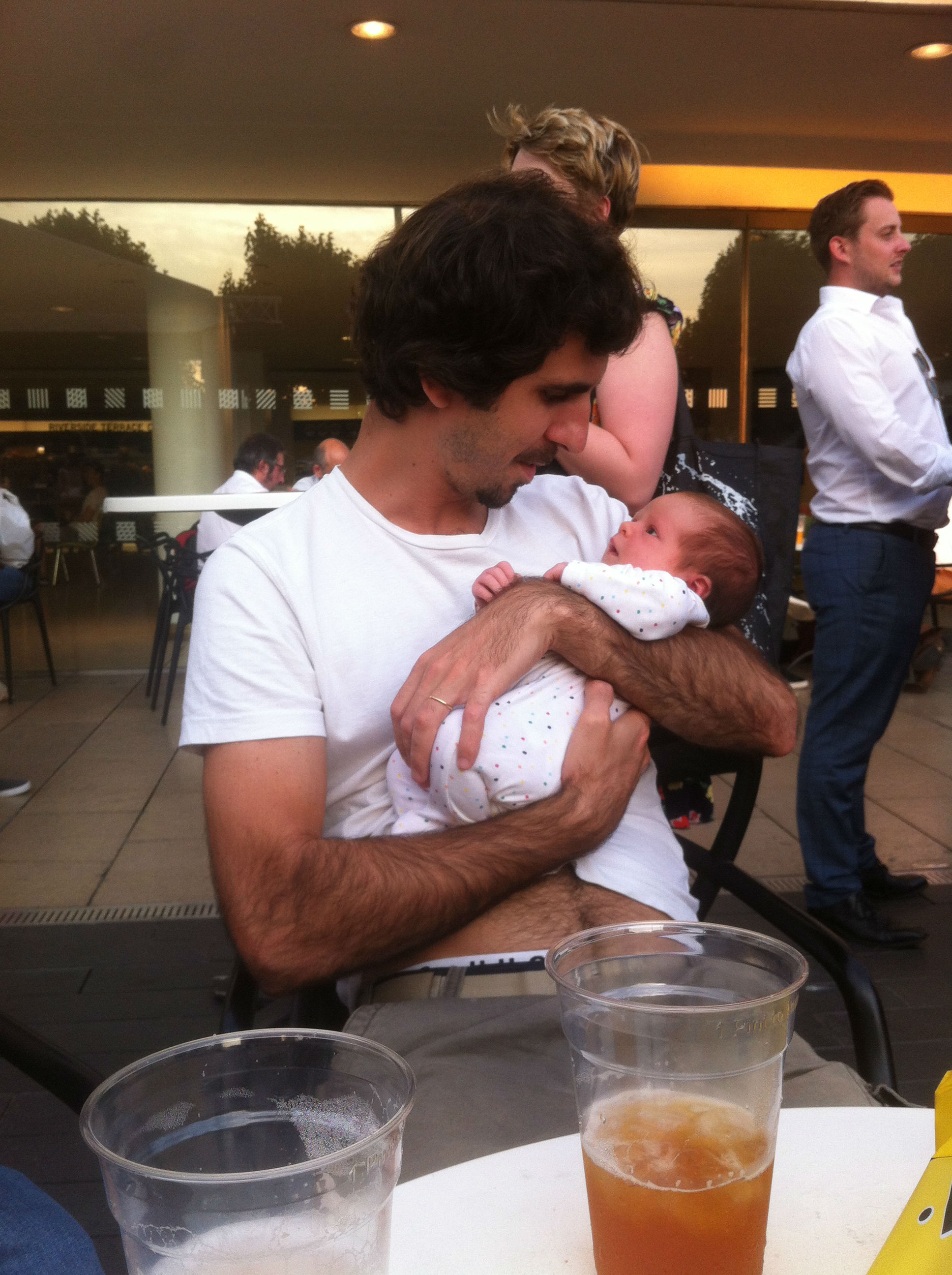
'Hypnobirthing may as well be called "hippie-birthing", because that’s what it is'
The comedian Russell Brand's fiancée Laura gave birth to their daughter Mabel in November 2016. The following is an extract from his new book Recovery: Freedom from Our Addictions by Russell Brand, £20.00
'Laura had been so pregnant for so long that any other state seemed inconceivable. I watched the house fill with subtle signs of a new arrival, a pram, tiny clothes and I myself participated in the painting of the baby’s room but it all seemed like an abstract and ceremonial exercise.
Something we were doing as a blind ritual of appeasement. I looked at the robust and ridiculous pram in the hallway and said to Laura, "But where will we go? When would we ever need such an object?" She did not enjoy the line and in fact became annoyed. I just couldn’t think what use a pram would be.
I don’t know why the world persists with the idea that a pregnancy lasts nine months either when it plainly lasts for ten and by the end of the ninth the waddling goddess does little but beseech the tardy heavens for delivery of this inconceivable cargo. Quietly I said my own prayer, I asked for preparedness knowing all was about to change but not knowing how. The change from not having a baby to having a baby is too radical to be taken in one almighty leap. It should be handled in instalments, like those magazines where each edition is accompanied by a further piece of the Cutty Sark or a Spitfire (issue one 99p – ‘I hope the second issue isn’t a fiver!’). The baby should arrive one foot at a time. An ankle independently issued, then a finger or an ear, the mouth last. If I can take care of this leg successfully, like a girl at an inner-city comp lugging around a bag of leaking and battered sugar, then I can take the rest of the infant in a few months. Instead the whole incredible bounty arrives in one opera of glorious revelation.
3 a.m. Friday the 4th of November 2016. "Russell," says a voice through the silence and the stillness. "I think it’s started." I know of course that this is a signal of commencement, a call to arms, the starting pistol has been fired but as a prospective father I do not know what manner of race is to follow or where the finishing line might be. When we awaited the result of the seven-week scan I relayed my concern to a friend: "What if there’s something wrong?" "Even if there isn’t," she said, "then you have the twelve-week scan, the thirty-six-week scan, the birth, the childhood, the adolescence. You’re a hostage to fortune now."
I’ve been awake since midnight, the contractions, or surges, are eight minutes apart. We call them "surges", when we remember, as the medical language around childbirth is negative and unhelpful, we learned on a course called "hypnobirthing", which may as well have been called "hippie-birthing" because that’s what it is. I get up and I think put the kettle on and move some towels around, having some semi-conscious recollection that this is what the situation demands. What I sense though, on the periphery of my awareness, is that a greater force is about to be asserted, reducing all of our human activity to ornamental incidentals.'
‘I did some counting while Laura was pushing and was told in no uncertain terms to stop’
Hywel Mills's wife Laura gave birth to their daughter Teddy in New York on 6th December 2015.
'Laura, my heroic wife, was in labour for about 56 hours. Her contractions started at 5am on Friday and then eventually our girl arrived on Sunday afternoon. During that time we went to the hospital three times; twice we were sent home because she wasn’t dilated enough to stay. We walked around the deserted Upper East Side at 1am. We went up and down the stairs in our building and walked around our neighbourhood in Brooklyn repeatedly. Laura bounced diligently on a yoga ball for hours. We watched an entire series of The West Wing. Neither of us slept very much, Laura less than me. Eventually, late on Saturday night, Laura was dilated enough to have an epidural and have some much needed rest. On Sunday, things got going (with a little help from some more drugs) and when it came time to push, Laura crushed it. Teddy was born in less than an hour.
We had had some ante-natal classes which helped us understand what was going to happen, but it doesn’t prepare you fully to get through it for when it actually happens to you.
Men don’t really talk to each other about childbirth, certainly not before your partner is pregnant. On TV and in films, it’s depicted as a moment of high drama, of dashing to the hospital and screaming pushes quickly followed by babies wrapped up neatly in a mother’s arms. It certainly wasn’t anything like that for us.
'At some point in the morning before Teddy was born, we heard blood-curdling screams down the hall. The nurse nonchalantly told us it was a woman having her second child. Without any painkillers.'
Walking around to help get things moving in Brooklyn, where there are many young families and I got lots of knowing looks, encouraging thumbs ups and smiles as Laura nestled her head in my chest to breathe through contractions. It was very sweet. I also imagine that people were thinking, “oh, you have no idea about what you’re going to go through next”.
There were definitely strong preferences about a few things but no strict birth plan. Laura was happy to take drugs as needed, and she really needed the epidural by the time she got it. At some point in the morning before Teddy was born, we heard blood-curdling screams down the hall. The nurse nonchalantly told us it was a woman having her second child. Without any painkillers.
The hospital staff were wonderful. We had several great New Yorker nurses who looked after us most of the time before the doctors arrived to deliver Teddy, who were brilliant… other than the junior doctor who was almost certainly on his first day of the job. He looked more shocked than I was at what was happening. He offered to go get ice chips. That was the last time we saw him.
I didn’t have a clue what to do when she started pushing. I did some counting and was told in no uncertain terms to stop. I went back to being encouraging and holding her hand.
Theodora - or Teddy as we call her - weighted 7lbs 7oz. She came out hungry and full of personality. Nothing has changed since.'
Hywel’s tips:
'Wear comfortable shoes.'
'Be prepared to be the one who takes as much stress away from your partner as you can by making sure she doesn’t have to deal with anything practical so she can focus on having the baby.'
This story was extracted from a blog post on Medium
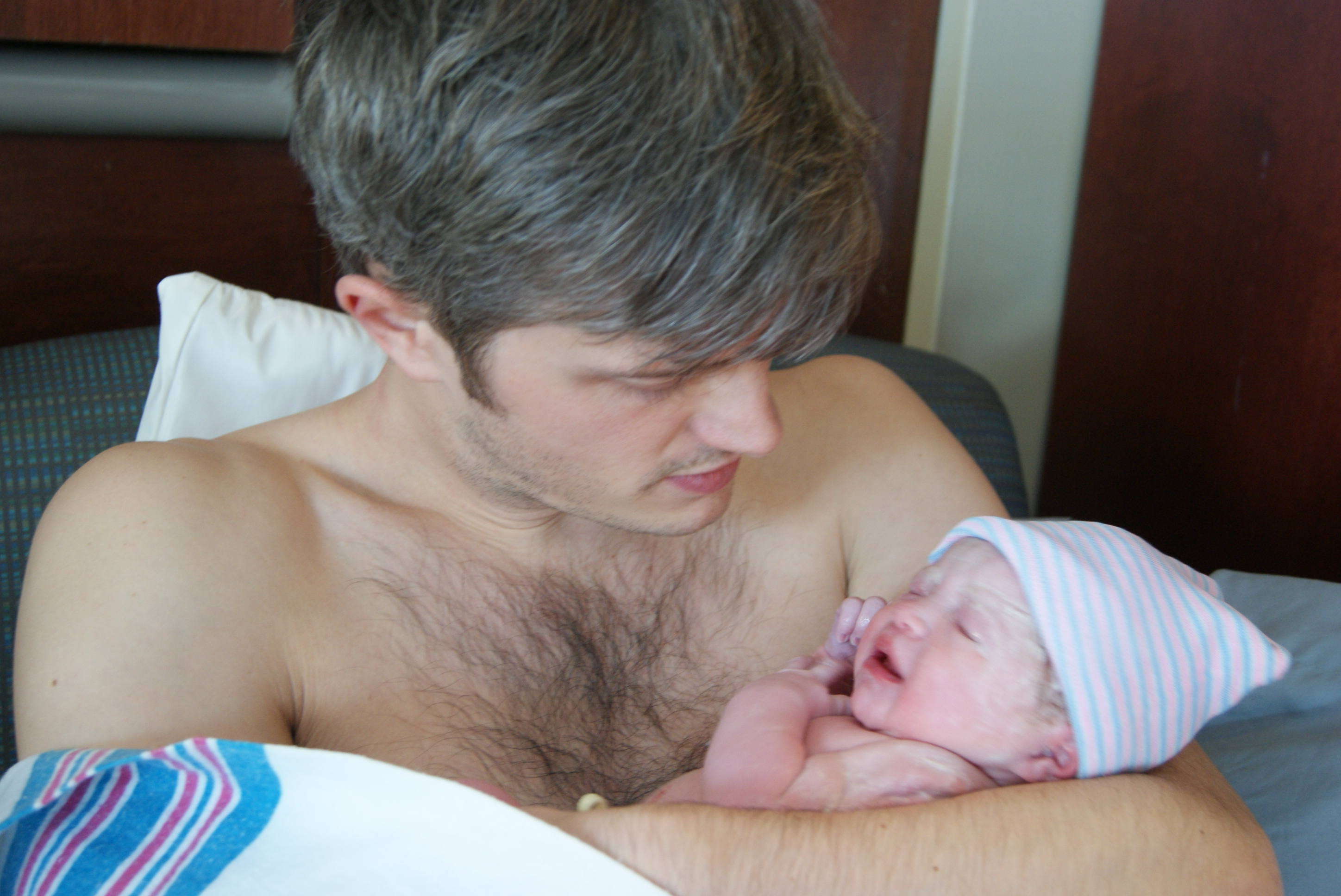
'When you know the exact date of the birth you can plan ahead'
Jon Cryer’s wife Olivia gave birth to their son Finn at the Royal Surrey Hospital, Guildford on 19th June
'It was two years after the birth of our daughter Ruby that my wife and I were told just how close we had come to losing her. The labour had been very traumatic, ending with an emergency c-section. It transpired that Olivia’s placenta had not been functioning properly for ten days before the birth so Ruby hadn’t been getting the sustenance she needed. After three days of labour, when the birth failed to progress, Ruby’s heart rate slowed right down and doctors rushed Olivia into theatre.
The birth of our son Finn was very different. As caesareans are so expensive (they cost the NHS thousands to carry out), NHS doctors will always try to convince you to go for a VBAC (vaginal birth after caesarean). But when we talked to a consultant about the details of Ruby’s birth he quickly understood that a caesarean was the best option.
When you know the exact date of the birth you can plan ahead. Olivia had her hospital bag ready to go and we had made plans to file Ruby off to her grandparents.
We arrived at the hospital at 8am but were warned there would be some waiting around; the theatre is prioritised for emergency c-sections so you have to wait for a free window. Our wait was relatively short (around five hours), after which things went very quickly. The birth was only around 45 minutes between being told the theatre was ready and Olivia having Finn put into her arms.
'I was surprised by how physical the operation was – they try to make as small an incision as possible so there’s a lot of tugging and the table was shaking.'
Olivia was taken off to get into a gown and I was given scrubs to wear with some particularly sexy orange crocs. Once you’re in the theatre it’s quite a rush, your heart is pounding and all you can think about is the safety of your child, even while you’re exchanging small talk with the doctors in the room (all the staff at the hospital were absolutely brilliant). A screen was put up over Olivia’s chest, which I stayed behind so I didn’t see what was going on. I was surprised by how physical the operation was – they try to make as small an incision as possible so there’s a lot of tugging and the table was shaking. Finn started crying almost as soon as he came out, we were able to do skin-to-skin and I cut the cord (one snip, like a pro).
When Ruby was born I had been an absolute mess - exhausted and emotional - and I’d had this nagging doubt that I wouldn’t be able to feel as strongly about Finn as I do about her. But as soon as he came out I was overwhelmed with the same love. There’s a great phrase in Winnie The Pooh that really sums it up: ‘Sometimes the smallest things take up the most room in your heart.’
Jon’s tips
'Don’t watch One Born Every Minute – it’s TV so they'll always show the dramatic births with the most screaming and the daftest partners.'
'Opt for an "enhanced recovery" caesarean if you can. This enabled Olivia to be out of hospital in just 30 hours.'
'Be very clear before the birth on what your partner doesn’t want. For Olivia, it was going under general anaesthetic as she wanted to be able to hold her baby immediately, so when they said that she would have to go under for Ruby, I was able to fight her corner (politely – you should never be rude to hospital staff, they’re only trying to help).'
'Once you’re out of hospital, wake up with your partner for those night feeds. You only get the opportunity to have a newborn a few times in your life and you’ll learn to read their signals better and support your partner if you’re there for those key moments.'
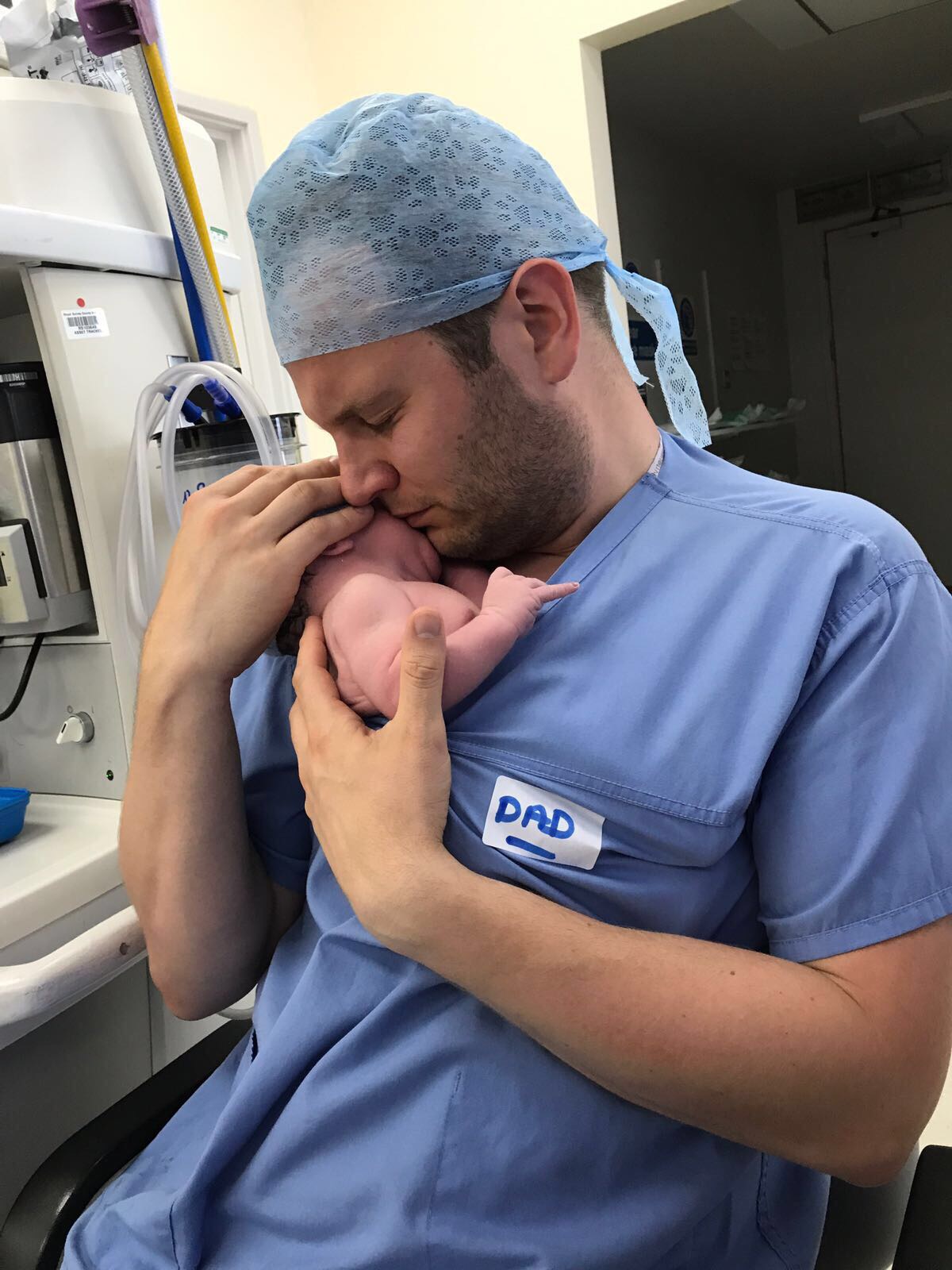
‘I thought holding him skin-to-skin would be faddy and pointless, but in the moment it felt like the only thing to do’
Michael Mullin's wife Marie gave birth to their son Arthur on 7th March 2016 at St George’s Hospital, Tooting
'No aspect of childbirth is tough for the Dad – tough starts when you get home and have two people to keep fed and watered. In hospital it’s the most amazing, life-affirming, visceral experience you will ever have.
My wife thankfully had a complication-free delivery, though even that is fairly dramatic at points. You inevitably feel a bit superfluous more than helpless, as if it would all be going on with or without you - which as a cold fact is right I suppose - but I did feel connected to the process in a small way.
'Women giving birth go into an almost-trance like state so getting through to them is hard'
The doctors and midwives in St. George’s were completely amazing, so I didn't feel protective of Marie against them, but I could see how that would be different if the proverbial hit the fan.
I just wanted to try and maintain communication with my partner and to let her know I was there, that she was doing well and that I loved her - incidentally that is really hard at the end, as [women giving birth] go into an almost-trance like state so getting through to them is hard. Afterwards, she told me she was aware that I was there, but the details are hazy.
Right after Arthur was born I held him 'skin to skin' for quite a while as my partner was so exhausted. We had debated beforehand whether I would do that - whip the shirt off, that is. My initial reaction was that it was a bit of a silly, faddy and ultimately pointless thing to do (also I've been nurturing a dad bod despite not being a dad since my teens, so add embarrassing), but in the moment it felt like the only thing to do.
I was ready to have a child, I was excited about it, but nothing could prepare me for actually seeing and holding him for the first time. Well, except watching Jacob imprint on Bella in Twilight - that's actually pretty close to how it feels so watching that would be a good preparation.'
Michael’s tips
'Practice the drive to the hospital and figure out where you will park.'
'Make sure you can install and uninstall the car seat in the dark, in the rain with one hand (this is not as easy as you might imagine).'
'Get all the baby pictures from the pro photographer lurking in the hospital - yes they’re expensive but they’re also great.'
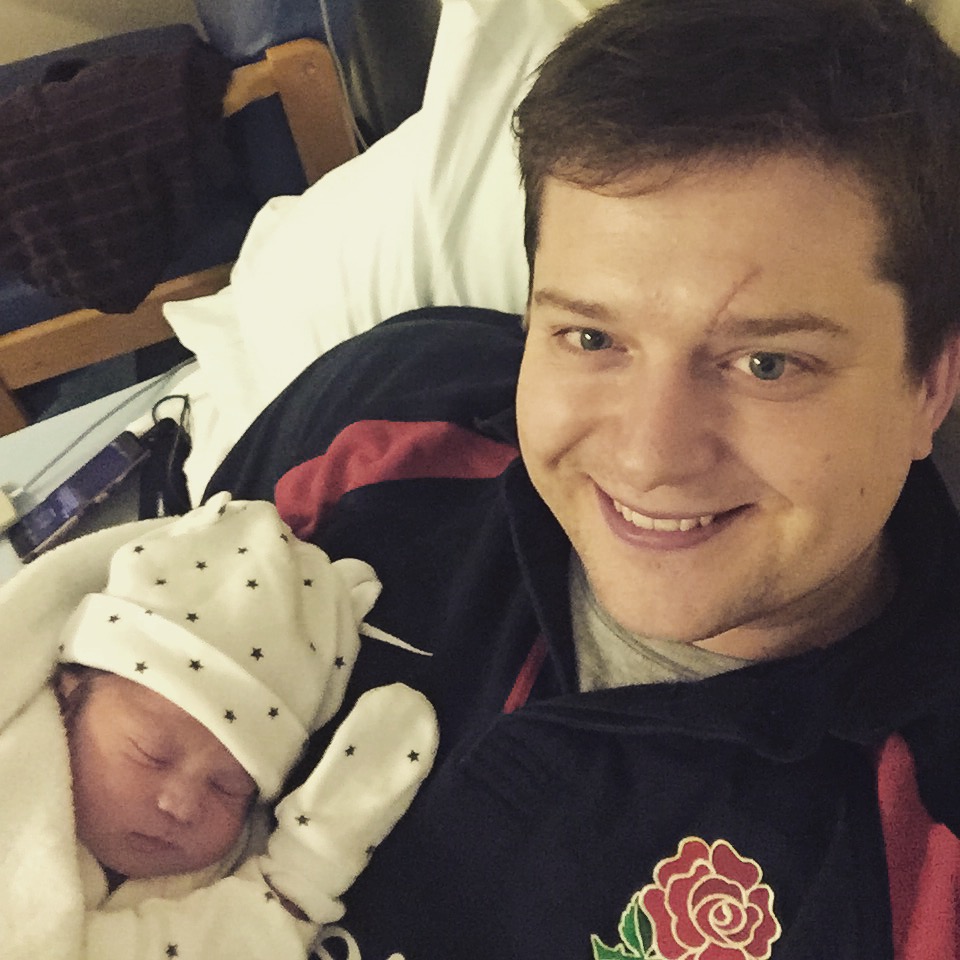
'It is so hard seeing the person you love in pain and not being able to do anything to help them'
Mikey Howe’s wife Heidi gave birth to their son Louis at Chelsea and Westminster Hospital on 17th July
'Two weeks before our due date, my wife Heidi thought her waters might have broken. We called Chelsea & Westminster hospital and they suggested we go in for a check-up. As Heidi was being checked, the midwife said ‘you’re not going anywhere.’
Having Louis two weeks early was definitely a surprise. I think we had naively assumed everything would go to plan. In the weeks leading up to the birth we had been completely distracted by renovating our new flat, and timed everything to give us a couple weeks of much needed “nesting” time. Still surrounded by boxes, we had only been there for a day before we were off to the hospital.
When we arrived they thought Heidi’s waters might have been breaking for a few days, which isn’t something I even knew could happen. The midwife said that Heidi was going to be induced - another thing I didn’t know much about.
Our original plan had been to have a water birth in the birthing unit at Chelsea and Westminster hospital - it’s all brand new and feels like you’re in a hotel – but because Heidi was induced, we were told we had to have our birth on the ward in order to be closer to the doctors.
'We hadn’t planned on an epidural, but there just came a point where it made sense to relieve the pain'
It is so hard seeing the person you love in pain and not really being able to do anything to help them. There were two occasions when our midwife hit the alarm, which meant the doctors and other hospital staff came rushing into our room. Those were the hardest moments; trying to reassure Heidi when I really didn’t know what was happening.
When I had a chance I stocked up on food and drinks to keep us going. Heidi struggled to eat and I didn’t have much appetite either. The most she could manage was sips of juice. I had planned on downloading some films on my ipad, but never had the opportunity.
Another thing we hadn’t planned on was having an epidural, but there just came a point during the labour where it made sense to relieve the pain Heidi was experiencing so she had the energy to push at the end and get Louis out safely.
Towards the end Heidi had been in labour for nearly 27 hours and she was absolutely exhausted. They had been listening to Louis’ heartbeat and it was starting to slow down. The midwife hit the alarm which started sounding throughout the ward and our room quickly filled hospital staff.
No-one had a chance to explain what was going on so I had to just hold Heidi’s hand while the doctor was trying to see how much further Louis had to go. They decided that he had to come out immediately, so they used the ‘ventouse’. They attached the suction cup to his head and while Heidi pushed, they pulled him out at the same time. I couldn’t help but look as he came out – I just wanted to know he was OK.
The best part was seeing our little man in Heidi’s arms for the first time, witnessing that mother-child connection and knowing he was perfect.'
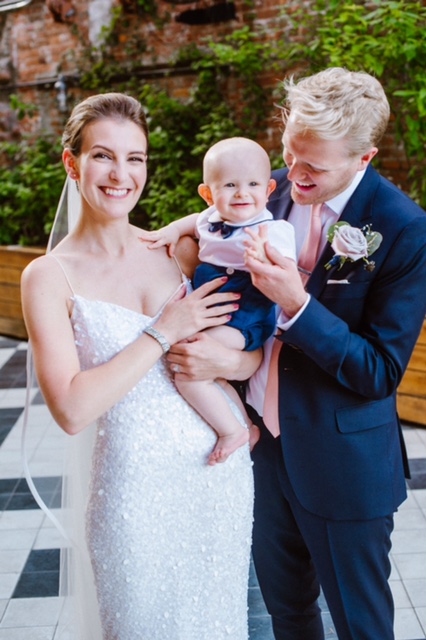
Mikey’s tips:
'One thing that really helped Heidi was having her own pillow. It sounds trivial but that little bit of comfort and familiarity made a big difference.'
'On the ward the bathrooms and communal showers get pretty messy as you can imagine, so I would recommend bringing flip flops!'
'Bring extra sets of clothes - including nighties with boob access - in case you have to stay longer than expected. And an extra set for the partner as well.'
